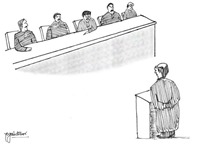National Judicial Appointments Commission (NJAC)
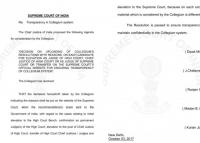 The Supreme Court’s collegium of Chief Justice of India (CJI) Dipak Misra and the next senior-most judges, justices J Chelameswar, Ranjan Gogoi, Madan B Lokur and Kurian Joseph, have begun to post recommendations for elevations and other business on a new ‘resolutions of the collegium’ section of its website according to minutes dated 3 October.
The Supreme Court’s collegium of Chief Justice of India (CJI) Dipak Misra and the next senior-most judges, justices J Chelameswar, Ranjan Gogoi, Madan B Lokur and Kurian Joseph, have begun to post recommendations for elevations and other business on a new ‘resolutions of the collegium’ section of its website according to minutes dated 3 October.
 And here’s one of the problems with the opaque collegium and judiciary, which rarely if ever officially confirms anything to journalists, leaving reporting on the bench to often be sourced on hints and whispers.
And here’s one of the problems with the opaque collegium and judiciary, which rarely if ever officially confirms anything to journalists, leaving reporting on the bench to often be sourced on hints and whispers.
Senior counsel Dushyant Dave, writing in The Wire, has criticised a number of recent decisions of the Supreme Court regarding judicial elevations and transfers, for having been as opaque (as ever) and having missed out on obvious candidates, suggesting that executive pressure scuppered the elevations of several judges who’d handed down decisions the government wouldn’t have liked.
 The Supreme Court collegium has finally completed its year-long-awaited draft of the memorandum of procedure (MOP), which would govern how judges are appointed in future, reported the The Times of India’s Dhananjay Mahapatra earlier today:
The Supreme Court collegium has finally completed its year-long-awaited draft of the memorandum of procedure (MOP), which would govern how judges are appointed in future, reported the The Times of India’s Dhananjay Mahapatra earlier today:
With the last batch of Supreme Court elevations having been made only in May 2016 with four new judges (who had been recommended in December 2015), the collegium’s latest recommendations of five new Supreme Court judges were cleared by the president yesterday.
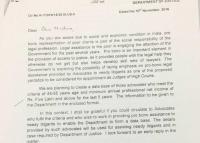 The law ministry has asked Bar Council of India (BCI) chairman Manan Kumar Mishra in a letter to help it create a list of lawyers who are willing to act pro bono in cases, which could end up being “one of the proposed yardstick (sic) to be considered for appointment as Judges of High Courts”.
The law ministry has asked Bar Council of India (BCI) chairman Manan Kumar Mishra in a letter to help it create a list of lawyers who are willing to act pro bono in cases, which could end up being “one of the proposed yardstick (sic) to be considered for appointment as Judges of High Courts”.
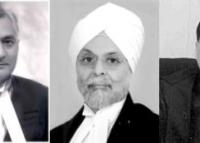 Supreme Court Justice JS Khehar has been formally confirmed by the President of India as the next Chief Justice of India (CJI) to succeed Justice TS Thakur and will be the first CJI from the Sikh community, according to the Indian Express.
Supreme Court Justice JS Khehar has been formally confirmed by the President of India as the next Chief Justice of India (CJI) to succeed Justice TS Thakur and will be the first CJI from the Sikh community, according to the Indian Express.
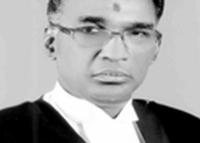 Justice Jasti Chelameswar, the fifth-most senior judge of the Supreme Court, and a member of the SC’s collegium, made the news today with the New Indian Express publishing his refusal to participate in a Supreme Court collegium meeting, as a protest against the collegium’s failure to comply with the principle of transparency of its proceedings.
Justice Jasti Chelameswar, the fifth-most senior judge of the Supreme Court, and a member of the SC’s collegium, made the news today with the New Indian Express publishing his refusal to participate in a Supreme Court collegium meeting, as a protest against the collegium’s failure to comply with the principle of transparency of its proceedings.
 The Supreme Court bench comprising of justices Ranjan Gogoi, Arun Mishra, and Prafulla C Pant today told Raj Kumar Mehta, the counsel for Lalit Kumar Mishra, the former Additional Judge of the Orissa high court, who challenged his non-appointment as the permanent judge of the high court that there are no records of the proceedings of the Supreme Court collegium.
The Supreme Court bench comprising of justices Ranjan Gogoi, Arun Mishra, and Prafulla C Pant today told Raj Kumar Mehta, the counsel for Lalit Kumar Mishra, the former Additional Judge of the Orissa high court, who challenged his non-appointment as the permanent judge of the high court that there are no records of the proceedings of the Supreme Court collegium.
 Following last year’s revival of the collegium system of judicial appointments by the Supreme Court’s constitution bench, which quashed the National Judicial Appointments Commission (NJAC) last year, the government is all set to revise the existing Memorandum of Procedure for appointment of judges of the Supreme Court and high courts, as suggested by the same bench.
Following last year’s revival of the collegium system of judicial appointments by the Supreme Court’s constitution bench, which quashed the National Judicial Appointments Commission (NJAC) last year, the government is all set to revise the existing Memorandum of Procedure for appointment of judges of the Supreme Court and high courts, as suggested by the same bench.
The Supreme Court collegium has transferred four Delhi high court judges to other high courts.
The collegium will not wait for the government’s new procedural guidelines on transparent judicial appointments, to start the process of appointment of 400 new high court judges and five new Supreme Court judges, reported the Hindustan Times.
High courts across India are facing 445 judicial vacancies at the moment, amounting to 57 per cent vacancy and facing a case pendency of 45 lakh.
No appointments were made in the higher judiciary ever since 2014 when the government notified the National Judicial Appointments Commission (NJAC). After the Supreme Court struck down the NJAC in October 2015, on 16 December it directed the government to formulate a new memorandum of process (MoP) for transparency in judicial appointments.
But the MoP is still not finalised and will likely take time due to the opinions of many stakeholders asked for, the government informed the court.
Union law minister DV Sadananda Gowda also recently announced his plan to appoint 115 high court judges to fight the rising toll of judicial vacancies expected to rise to 472 in India’s high courts by end of June.
The Supreme Court’s five-judge constitution bench headed by Justice JS Khehar is set to pronounce its consequential judgment in the National Judicial Appointments Commission (NJAC) case in the morning today (16 December) at Court No 3 at 10:30 AM
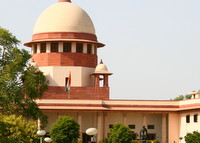 As the Supreme Court’s five-Judge Constitution Bench presided over by Justice JS Khehar began its hearing on reforming the collegium (the in-house mechanism to recruit Judges to the higher judiciary after its recent revival by the same bench) the bench sought advice from counsel on both sides on how to navigate the plethora of diverse proposals which it received.
As the Supreme Court’s five-Judge Constitution Bench presided over by Justice JS Khehar began its hearing on reforming the collegium (the in-house mechanism to recruit Judges to the higher judiciary after its recent revival by the same bench) the bench sought advice from counsel on both sides on how to navigate the plethora of diverse proposals which it received.
As Justice Khehar-led Constitution Bench reassembles today (3 November) to hear proposals for reforming the revived collegium to select judges of the higher judiciary, it cannot help listening to the echoes of its momentous decision to strike down the 99th Amendment Act and the NJAC Act in their entirety, even two weeks after it was delivered on 16 October.
Advocate Mathews J Nedumpara has filed a review petition against the Supreme Court’s decision to strike down the National Judicial Appointments Commission (NJAC) Act and the 99th constitutional amendment reported the Times of India.
Nedumpara asserts in his petition that the law creating the NJAC deserves to live because it was passed by the parliament after ratification by 20 state legislatures, that the collegium system is “incurable” and that the Supreme Court’s decision to quash the law created a public perception that there was “a deceptive/clever attempt on the part of the Supreme Court to retain the power of appointing judges, which they have been enjoying for the last more than 22 years”.
Mathews also, reportedly, claimed that it is “preposterous to think” that the court has jurisdiction to declare what India’s law should be.
“There is only one hope i.e. the judges themselves realise in all humility that they are fallible and they have erred in passing the verdict. Even the Pope, once regarded as infallible, is no longer considered to be so. If the powerful Catholic Church could accept the theory of fallibility, the judges of the Supreme Court too should readily accept their fallibility and acknowledge that they have erred,” the petition reportedly states.
The Supreme Court had quashed the National Judicial Appointment Commission Act and 99th Constitutional Amendment Act as illegal two weeks ago.
